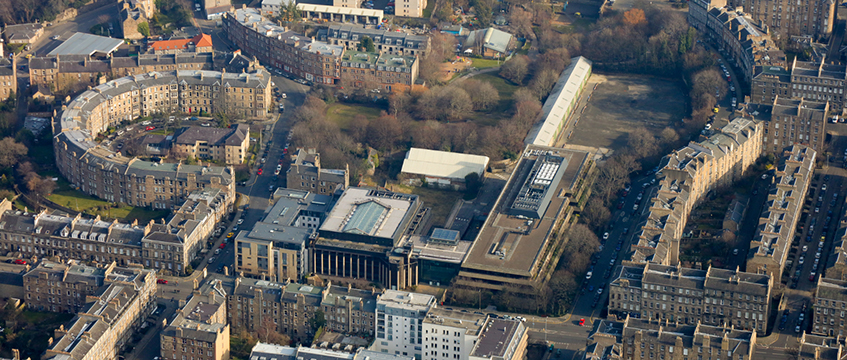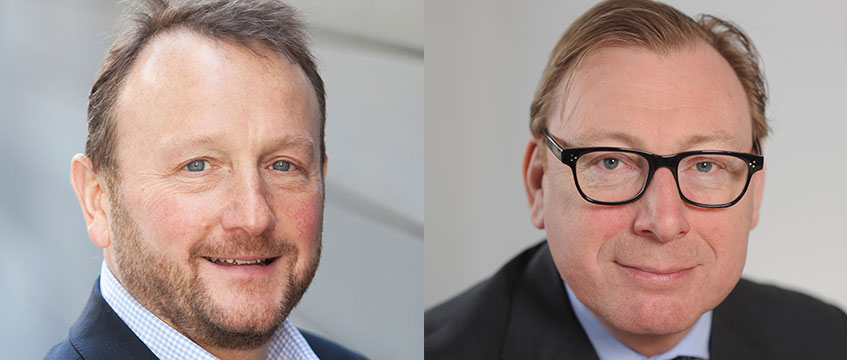Buccleuch Property is setting out its stall as a serious contender in investment and development circles. EG speaks to managing director David Peck and executive chairman Benny Higgins about its ambitions, in their first joint interview since the firm’s management reshuffle last year
When Benny Higgins (pictured above, right), a former chief executive of RBS’s retail banking business, replaced Richard Scott, the tenth Duke of Buccleuch, as the family office’s executive chairman last year, it sent a clear message to the industry: the group means business.
Edinburgh-based Buccleuch, one of Scotland’s largest private landowners, has since embarked on a drive to slim down its sprawling rural estate and expand its commercial property arm to create more diverse sources of profit. Beyond these two divisions, it also has interests in hospitality and tourism, energy and forestry.
Buccleuch’s property division, which has more than 12,000 consented homes sitting in its 3.5m sq ft development pipeline, counts Native Land, Cruden Group and Wrenbridge among its joint venture partners.
The business has increasingly been a bidder for redevelopment sites, including the 5.9-acre New Town North plot (pictured below), which once hosted RBS’s offices at Dundas Street in Edinburgh. This was eventually bought by Ediston Real Estate and Orion Capital Managers last year, for around £35m.

Along with a stated objective to “put more money into property”, Higgins and David Peck, managing director of the group’s real estate business since 2003 (pictured above, left), told EG about the group’s ambitions to become a bigger contender in real estate circles, in their first joint interview.
What has the change in chairman meant within the group?
Higgins: When there is a change of leadership, it’s a good opportunity to think about how you can do things differently.
I’ve come from a more conventional, corporate, institutional world – I’m not trying to make Buccleuch like that, or it will lose some of its strength, but over the past year I have aimed to bring some of the disciplines involved.
We have created a slightly more formal structure of how we meet and have reviewed our strategy. We went back and reviewed the values of the business and reworded them in a language that I’m happy with.
What are the firm’s criteria for acquisitions?
Peck: We are looking to invest £50m this year – on an annualised basis over our five-year business plan – split broadly between investment and development. A lot of that comes through recycling from existing transactions, and a little additional new resource as well.
We don’t see ourselves as buyers of completed product at 4.25% or 4.5% – we’ll leave the institutions and long-term investors to be the eventual owners. We’ll do the value creation bit at the front end.
Which sectors offer the most compelling opportunities for expansion?
Peck: Strategy-wise, there is a focus around what we would politely call beds and sheds. The residential market – and, around that, build-to-rent – is getting some quite good traction. On a geared, IRR basis we look for around 12% on our investment assets, and more than 20% on our developments.
Residential has such a strong underlying rationale, as does the industrial market – the smaller to mid-level industrial properties, that is, not the big boxes. That’s where we’ll be happiest playing for the next few years.
In terms of industrial, 50,000-60,000 sq ft and under is where we feel more comfortable and see stronger demand, located more centrally as well as in the South East.
Retail remains a challenging market, and yet there may be opportunistic purchases. We haven’t bought anything yet, but we have certainly looked at it.
Wild-card wise, we are still working out how to do primary care and assisted living – demographically it’s an area we’d like to do more in, and we are looking actively at it. We may well enter the market at some point.
How global are Buccleuch’s ambitions?
Higgins: We haven’t explored it formally yet, but… the family’s purpose and investment approach could lend itself to a bit more international exposure. Property would be the easiest and safest way to progress that initially. That’s a subject we will discuss this year.
Australia would be an obvious place – Sydney, Melbourne. We also do a little bit of asset management for external parties. We manage quite a large industrial portfolio for a Hong Kong-based investor.
We’ve certainly looked at a number of other opportunities to expand that side of the business. It’s something we’re looking at more closely at the moment, to bolt on to our existing ownerships as an additional facet to what we do.
See also: Buccleuch puts West London resi scheme up for sale
To send feedback, e-mail pui-guan.man@egi.co.uk or tweet @PuiGuanM or @estatesgazette











